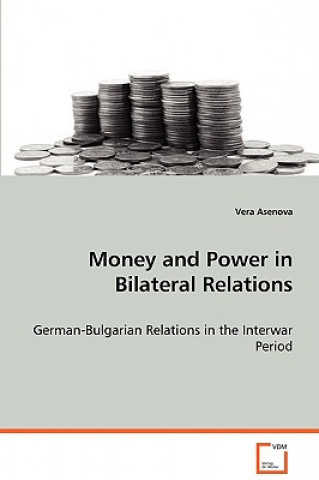
Kod: 06813074
Money and Power in Bilateral Relations
Autor Vera Asenova
As a response to the Great Depression in 1931 Germany adopted a policy of exchange control where the movement of foreign currency was subject to government control. This regime served as a defense measure against currency devaluat ... więcej
- Język:
 Angielski
Angielski - Oprawa: Miękka
- Liczba stron: 56
Wydawca: VDM Verlag Dr. Mueller E.K., 2008
- Więcej informacji o książce

Zobacz książki o podobnej tematyce
-

Atchafalaya River Basin
162.43 zł -

Foreign Affairs
76.10 zł -22 % -

School Of Life (1905)
95.33 zł -

Menstrual Cycle
745.89 zł -22 % -

Remember Your Rubbers!: Collectible Condom Containers
119.01 zł -10 % -

Confessions de Tullia
112.95 zł -4 % -

Stephen Ward
62.03 zł
Podaruj tę książkę jeszcze dziś
- Zamów książkę i wybierz "Wyślij jako prezent".
- Natychmiast wyślemy Ci bon podarunkowy, który możesz przekazać adresatowi prezentu.
- Książka zostanie wysłana do adresata, a Ty o nic nie musisz się martwić.
Więcej informacji o Money and Power in Bilateral Relations
Za ten zakup dostaniesz 147 punkty
 Opis
Opis
As a response to the Great Depression in 1931 Germany adopted a policy of exchange control where the movement of foreign currency was subject to government control. This regime served as a defense measure against currency devaluation but it inhibbited international payments among exchange control countries.Trade between them was organized on the basis of bilateral clearing agreements, which centralized both foreign trade and payments at the state level. The book analyzes the clearing system in the case of Germany's relations with Bulgaria, which developed the highest trade dependence on Germany in the 1930s. An almost complete opposition of free trade, bilateral clearing is seen as a mechanism of political power maximization and resource allocation from the periphery to its core. Using Jonathan Kirshner's framework of monetary power the work offers a detailed analysis of the link between international monetary relations and political power. The shift of international trade regime from a Gold Standard and free trade to exchange control and bilateral clearing provided an opportunity for the German government to covertly finance its expenditure in the 1930's and during WWII. As a response to the Great Depression in 1931 Germanyadopted a policy of exchange control where themovement of foreign currency was subject togovernment control. This regime served as a defensemeasure against currency devaluation but itinhibbited international payments among exchangecontrol countries.Trade between them was organized onthe basis of bilateral clearing agreements, whichcentralized both foreign trade and payments at thestate level.The book analyzes the clearing system in the case ofGermany's relations with Bulgaria, which developedthe highest trade dependence on Germany in the 1930s.An almost complete opposition of free trade,bilateral clearing is seen as a mechanism ofpolitical power maximization and resource allocationfrom the periphery to its core. Using JonathanKirshner's framework of monetary power the workoffers a detailed analysis of the link betweeninternational monetary relations and political power.The shift of international trade regime from a GoldStandard and free trade to exchange control andbilateral clearing provided an opportunity for theGerman government to covertly finance its expenditurein the 1930's and during WWII.
 Szczegóły książki
Szczegóły książki
Kategoria Książki po angielsku Society & social sciences Politics & government International relations
254.37 zł
- Pełny tytuł: Money and Power in Bilateral Relations
- Podtytuł: German-Bulgarian Relations in the Interwar Period
- Autor: Vera Asenova
- Język:
 Angielski
Angielski - Oprawa: Miękka
- Liczba stron: 56
- EAN: 9783639033892
- ISBN: 3639033892
- ID: 06813074
- Wydawca: VDM Verlag Dr. Mueller E.K.
- Waga: 86 g
- Wymiary: 229 × 152 × 3 mm
- Data wydania: 07. August 2008
Ulubione w innej kategorii
-

On Palestine
47.46 zł -14 % -

Prisoners of Geography
47.56 zł -23 % -

World Order
52.21 zł -23 % -

International Relations, Global Edition
426.17 zł -

Grand Chessboard
96.74 zł -

Diplomacy
79.34 zł -14 % -

Clash of Civilizations and the Remaking of World Order
75.90 zł -13 % -

Hundred-Year Marathon
79.64 zł -13 % -

The Spy and the Traitor
52.62 zł -15 % -

Understanding the Intelligence Cycle
312.32 zł -

Who Rules the World?
52.21 zł -23 % -

Who Rules the World?
49.18 zł -14 % -

Dead Aid
68.61 zł -12 % -

World Order
61.52 zł -15 % -

Adults In The Room
61.52 zł -23 % -

Legacy of Ashes
79.64 zł -13 % -

Evolution of Cooperation
81.77 zł -

Strategic Vision
77.62 zł -11 % -

Secret World
88.34 zł -14 % -

Geopolitics and Geoculture
93.61 zł -29 % -

Dawn of Eurasia
52.21 zł -23 % -

How Spies Think
52.62 zł -15 % -

Gaza in Crisis
52.21 zł -23 % -

Planetary Cycles Mundane Astrology
93 zł -

OVERTHROW : AMERICA'S CENTURY OF REGIME
101.70 zł -13 % -

Is the EU Doomed?
105.55 zł -

Righteous Victims
96.54 zł -11 % -

Directorate S
81.56 zł -10 % -

Europe's Border Crisis
177.10 zł -

America's Strategy in World Politics
327.90 zł -

Destroying Libya and World Order
94.72 zł -

amantes del fin del mundo
93.63 zł -

Critical Practices in International Theory
906.50 zł -

My Nationalist Pony
150.18 zł -

American Century and Beyond
102.11 zł -4 % -

Heroic Failure
49.18 zł -14 % -

Oxford Handbook of the European Union
226.59 zł -

Rise and Kill First
79.34 zł -14 % -

PEACE TO END ALL PEACE
98.97 zł -14 % -

Tragedy of Great Power Politics
94.11 zł -7 % -

Countdown to Zero Day
75.90 zł -13 % -

Revenge of Geography
87.13 zł -12 % -

Political Order and Political Decay
70.73 zł -23 % -

Naked Diplomat
61.52 zł -23 % -

Against Our Better Judgment
53.63 zł -

After the Empire
62.03 zł -

Legacy of Ashes
89.15 zł -23 % -

Dragons and the Snakes
137.13 zł -9 % -

Oxford IB Diploma Programme: Global Politics Course Book
266.67 zł
zadowolonych klientów
Od roku 2008 obsłużyliśmy wielu miłośników książek, ale dla nas każdy był tym wyjątkowym.
Copyright! ©2008-24 libristo.pl Wszelkie prawa zastrzeżonePrywatnieCookies



 21 milionów książek
21 milionów książek Dostawa 10.99 zł
Dostawa 10.99 zł (32) 444 93 66 (8-15.30h)
(32) 444 93 66 (8-15.30h)